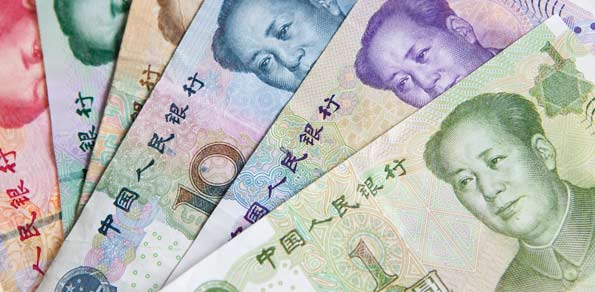Following the Battle of Plassey in 1757, in which Britain annexed Bengal to its empire, the British East India Company pursued a monopoly on production and export of Indian opium. The monopoly began in earnest in 1773, the British Governor-General of Bengal abolished the opium syndicate at Patna. For the next fifty years opium trade would be the key to the East India Company’s hold on the subcontinent…
The importation of opium into China was banned by Chinese law, the East India Company established an elaborate trading scheme by leveraging illicit markets. British merchants carrying no opium would buy tea in Canton on credit, and would balance their debts by selling opium at auction in Calcutta. From there, the opium would reach the Chinese coast hidden aboard British ships then smuggled into China by native merchants. In 1797 the company tightened its grip on opium trade by enforcing direct trade between opium farmers and the British ending the role of Bengali purchasing agents.
British exports of opium to China grew from 15 tons in 1730 to 75 tons in 1773. The product was shipped in over two thousand chests, each containing 140 pounds (64 kg) of opium. Meanwhile, negotiations with the Qianlong Emperor to ease the trading ban carried on, coming to a head in 1793 under Earl George Macartney. Such discussions were unsuccessful.
The Opium Wars, also known as the Anglo-Chinese Wars, divided into the First Opium War from 1839 to 1842 and the Second from 1856 to 1860, were the climax of disputes over trade and diplomatic relations between China under the Qing Dynasty and the British Empire. After the inauguration of the Canton System in 1756, which restricted trade to one port and did not allow foreign entrance to China, the British East India Company faced a trade imbalance in favour of China and invested heavily in opium production to redress the balance.
British and United States merchants brought opium from the British East India Company’s factories in Patna and Benares, in the Bengal Presidency of British India, to the coast of China, where they sold it to Chinese smugglers who distributed the drug in defiance of Chinese laws. Aware both of the drain of silver and the growing numbers of addicts, the Dao Guang Emperor demanded action.
Officials at the court who advocated legalisation of the trade in order to tax it were defeated by those who advocated suppression. In 1838, the Emperor sent Lin Zexu to Guangzhou where he quickly arrested Chinese opium dealers and summarily demanded that foreign firms turn over their stocks…
The city could do with the extra revenue that’s for sure. London, the world’s biggest centre for foreign-exchange trading, cross-border bank lending and interest-rate derivatives, is being squeezed by both the impact of the European sovereign-debt crisis on demand for its services and politicians who blame financiers for bringing the world economy to the brink of collapse. Banks are responding to the Basel Committee on Banking Supervision’s latest rules by exiting capital-intensive activities such as proprietary trading, putting at risk the U.K.’s biggest exporting industry and 12 percent of its tax receipts.
London’s Square Mile is shrinking faster than any financial centre in the world. Having fired more employees than in any other country last year, the capital’s banks are facing falling trading revenue, attacks from politicians to reduce pay and more job cuts. The U.K. government wants banks to split their consumer and investment banking units while European Union leaders are pushing to tax individual trades by the end of this year.
So where exactly are we in relation to seeing renminbi paired with the greenback on our trading platforms given the fact that the people’s currency is not fully convertible? Some way off is the answer, but the progress and rise of the renminbi has been remarkable.
Mr. Osborne apparently signed a deal on Monday with Hong Kong aimed at the City becoming an offshore trading centre for the renminbi. The chancellor agreed technical measures with Norman Chan, chief executive of the Hong Kong Monetary Authority, to help London play an important role in increasing the renminbi’s standing as a big global currency.
China has given its backing to London’s ambitions to become a significant offshore renminbi trading centre; Hong Kong is the world’s biggest offshore centre for the Chinese currency, acting as a gateway for the onshore market in mainland China. The Hong Kong Monetary Authority recently announced that it was to extend the operating hours of its renminbi payments system by five hours so as to facilitate better offshore trading with London, extending the window through which financial institutions in London can settle offshore renminbi payments.
Total Chinese trade settled in renminbi has increased from 0.7 per cent in the first half of 2010 to more than 9 per cent in the first half of 2011. Renminbi deposits in Hong Kong have increased from Rmb64bn in January 2010 to Rmb627bn in November 2011. Bank of China said it “strongly supports” London to be the next offshore renminbi trading centre, after Hong Kong.
However, despite the razzmatazz there is one huge fly in the caustic ointment, the USA. The day the renminbi appears on our charts as a currency pair versus most of it’s peers will be a day closer to the currency becoming the planet’s reserve currency. Oil priced in renminbi? As the brief history lesson, contained in the first few paragraphs reveals, countries will go to any lengths to preserve trade and their perceived status. The USA’s reaction to the people’s currency becoming the globe’s currency will be the ultimate test of persuasion to stand down from their hegemony.





